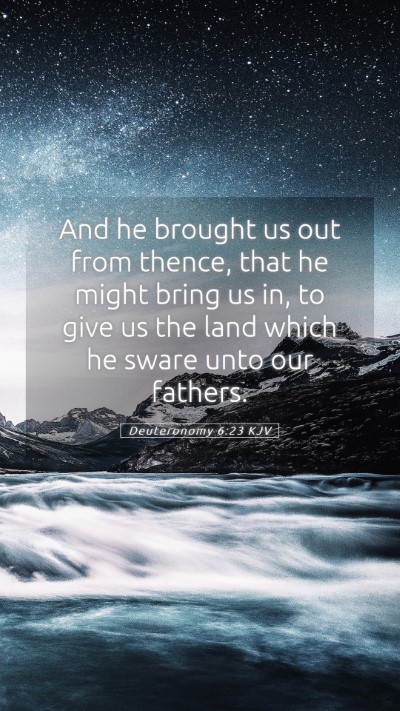Understanding Deuteronomy 6:23
Deuteronomy 6:23 states: "And he brought us out from thence, that he might bring us in, to give us the land which he sware unto our fathers." This verse encapsulates a central theme of deliverance, promise, and the unfolding plan of God for His people, the Israelites.
Summary of the Verse
In this verse, Moses reminds the Israelites of their liberation from Egyptian bondage and the divine purpose behind their exodus. God did not merely free them from slavery; His intent was to lead them into a land flowing with milk and honey, a place of prosperity and rest. This transition from captivity to promise is crucial in understanding Israel's identity as a nation chosen by God.
Bible Verse Meanings
The meaning of this Bible verse can be unpacked through insights from renowned public domain commentaries:
- Matthew Henry emphasizes the importance of remembrance. He notes that this passage teaches us to reflect on God's deliverance and to recognize the aim of that deliverance as a movement toward a blessed inheritance.
- Albert Barnes highlights the assurance of God’s promises. He explains that the historical act of bringing the Israelites out of Egypt is a prefiguration of spiritual deliverance for all believers, symbolizing freedom from sin and access to spiritual blessings.
- Adam Clarke brings attention to the covenant aspect of the verse. He insists that God’s promise to give the land was not arbitrary but rooted in His covenant with the forefathers—Abraham, Isaac, and Jacob—illustrating God’s faithfulness through generations.
Bible Verse Interpretations
Different interpretations of this verse highlight various theological and practical aspects:
- Historical Context: Understanding the historical circumstances surrounding the Israelites' journey from Egypt to Canaan is essential. The Exodus was not just about physical liberation, but a spiritual journey towards fulfilling God's covenant promises.
- Theological Implications: The verse emphasizes God’s proactive role in redemption and guidance, showcasing His sovereignty in directing history towards divine fulfillment.
- Personal Application: For contemporary readers, the verse urges believers to recognize God’s continual work in their lives, guiding them from places of bondage toward the fulfillment of His promises.
Scripture Analysis
An in-depth Bible verse analysis reveals the richness of Deuteronomy 6:23:
This verse not only recounts historical events but also provides foundational truths about God's character—His faithfulness, His promises, and His desire for relationship with His people. As one studies the intricacies of this verse, several themes emerge:
- Deliverance: God's act of saving the Israelites signifies a redemptive plan that transcends their immediate circumstances.
- Promise: The land promised to the Israelites symbolizes both physical abundance and spiritual rest, pointing to God's greater plan for humanity.
- Legacy: The mention of "our fathers" connects the current generation to their heritage, emphasizing the importance of passing down faith and the understanding of God's work across generations.
Biblical Exegesis
Biblical exegesis involves unpacking the deeper meanings within Scripture. Deuteronomy 6:23 serves as a reminder of how God prepares His people:
- This preparation is not limited to ancient Israel; it also speaks to all believers today about their spiritual journey from darkness to light and from sin to salvation.
- In the New Testament, references to being "brought out" can be linked to Christ's redemptive work on the cross, highlighting the direct relationship between Old Testament deliverance and New Testament salvation.
Applying Bible Verses to Daily Life
Understanding the application of Deuteronomy 6:23 in a practical context can benefit individuals as they navigate their faith journey:
- Recognizing personal deliverance from life’s challenges and trusting that God is leading toward new growth and blessings.
- Utilizing the remembrance of God’s past faithfulness to foster hope and strength in future endeavors.
- Engaging in community discussions (like Bible study groups) about God's promises and how they manifest in everyday life.
Cross References
This verse relates closely to several others that expand on its themes, including:
- Exodus 3:8: "So I have come down to rescue them from the hand of the Egyptians and to bring them up out of that land into a good and spacious land." This emphasizes the divine promise of land and liberation.
- Joshua 24:13: "I gave you a land on which you did not toil and cities you did not build, and you live in them and eat from vineyards and olive groves that you did not plant." This reaffirms the fulfillment of God's promise to Israel.
- Romans 8:32: "He who did not spare his own Son but gave him up for us all, how will he not also, along with him, graciously give us all things?" This connection draws a parallel to God’s ultimate provision for His people.
Conclusion
Deuteronomy 6:23 encapsulates rich theological themes of deliverance, promise, and divine faithfulness. Through the insights gained from public domain commentaries and scripture analysis, readers can derive deeper meanings and applications applicable to their spiritual lives. This understanding encourages believers to remember God's acts of salvation, understand their spiritual heritage, and trust in His future promises. Whether studying alone or in Bible study groups, this verse serves as a foundational reminder of God's enduring commitment to His people.


